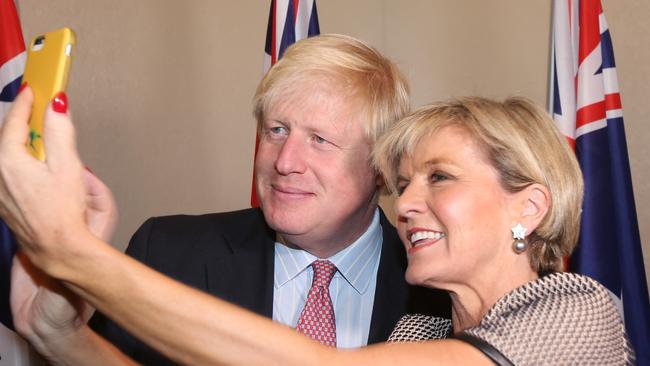Boris Johnson hails new dawn for Brits in Asia-Pacific
Boris Johnson has proclaimed a new role for Britain in Asia and a new commitment to its relationship with Australia.

British Foreign Secretary Boris Johnson has proclaimed a new role for Britain in Asia and a new commitment to its relationship with Australia, on the first day of his three-day Sydney visit.
In an exclusive interview with The Australian, Mr Johnson said a key purpose of his trip, which has taken in Japan and New Zealand, was to convey that: “We are now going to be more committed to the Asia-Pacific region and more committed to Australia.”
He is optimistic about the prospects for an early free-trade agreement with Australia following Britain’s exit from the EU.
Mr Johnson made another passionate defence of Britain’s decision to leave the EU, citing Australia as an example Britain could follow.
“It’s fantastic to see the success of this country, it’s a repudiation of some of the gloom-mongering (around Brexit),” he said.
“Just imagine if APEC had a court, and a parliament, and a currency, and a tendency to have a treaty every five years causing ever-greater integration. Would Australia sign up to that? Has Australia suffered from the lack of that?” Mr Johnson said Brexit gave the British government “the chance to think afresh about commercial opportunities and about the (Asian) region”.
Asia was an area of “fantastic growth” but also of “tension”, and regional nations wanted Britain to be more involved. “People want the involvement of a country that sticks up for the rules-based international system, that is prepared to deploy its military in the area as we are,” Mr Johnson said.
He will participate today with British Defence Secretary Sir Michael Fallon and their Australian counterparts, Julie Bishop and Marise Payne, in the annual Australia-Britain ministerial talks. They will canvass future trade opportunities, but the talks will focus primarily on security issues, in particular cyber security, North Korea, the South China Sea, counter-terrorism, the fight against Islamic State in Syria and Iraq, and the return of foreign fighters.
Canberra has pressed London to take a higher profile in Asia. As well as the “Five Eyes” intelligence-sharing arrangements, Australia is involved in a collective security agreement with Britain in Asia, the Five Power Defence Arrangements, with Malaysia, Singapore and New Zealand.
When asked about China’s behaviour in the South China Sea, Mr Johnson stressed Britain did not take a position on the merits of the rival cases for sovereignty put by claimant nations in the South China Sea. However, he said nations should follow the international court ruling on the issue.
Last July the Permanent Court of Arbitration issued a ruling based on the UN Convention on the Law of the Sea, which held that Beijing had no claims to the islands it had occupied in the South China Sea which had traditionally been controlled by The Philippines, and that it had violated the rights of other nations in its actions there.
Mr Johnson said: “It is absolutely clear the UNCLOS ruling must be abided by. We believe the Law of the Sea is there to be honoured. We do not want to see the militarisation of that area.”
He also rejected any idea that US allies should distance themselves from Washington because of the international unpopularity of US President Donald Trump.





To join the conversation, please log in. Don't have an account? Register
Join the conversation, you are commenting as Logout